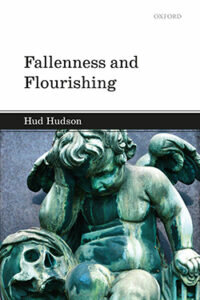I am delighted to respond to Hud Hudson’s Fallenness and Flourishing. I played basketball with Hudson one summer in Bellingham, Washington, but never got acquainted with him. Reading Fallenness and Flourishing made me regret missing that opportunity. Hudson is funny, philosophically sharp, and literarily sensitive. I’m especially drawn to Hudson because I share his penchant for pessimism. However, I am less confident than he that pessimism as a philosophy of life is warranted or beneficial.
The story Hudson tells can be compressed as follows:
(1) The world is bleak and most everybody is ill-off and unhappy.
(2) This is a consequence of human sin, especially our prideful efforts to pursue happiness independently of God.
(3) Such efforts mire us in unhappiness, particularly in the deadly sin of sloth: apathetic resistance to the demands of love.
(4) Since sloth diminishes human agency, we need God’s atoning grace to extricate ourselves from our unhappiness.
(5) The virtue of obedience opens us up to this grace.
Sentence (1) is my attempt to state Hudson’s “philosophy of pessimism.” He claims that “the philosophy of pessimism is well grounded, quite independently of any particular religious orientation” (p. 43). He spends the first chapter of the book making the case for a philosophy of pessimism, and he hints that embracing the philosophy of pessimism is crucial to his argument: “If one denies the philosophy of pessimism, I can only recommend revisiting Chapter 1 and its sources” (p. 49). I’d like to raise some questions about this philosophy of pessimism and its role in the overall argument.
First, what exactly is Hudson’s philosophy of pessimism? He does not offer a definition. The following citations showcase his two most substantive approaches to one:
At its core, the philosophy of pessimism simply offers (on the whole) dismal predictions about what nearly all of us can expect to experience in our private lives and interpersonal relationships, about the welfare of our fellow creatures, about the character of our social institutions and global politics, and about our prospects for progress on these matters in the future. The philosopher of pessimism articulates and advances reasons in favor of or refutes reasons opposed to this general worldview (p. 2).
It is no part of the philosophy of pessimism to argue that there are not genuine goods or that we are helpless to produce them, dependent on the winds of chance to occasionally blow them in our direction. Rather, the philosopher of pessimism simply maintains that the quantity and quality of disvalue that comes into being regularly outpaces the production of goods (which we tend to exaggerate and magnify), that a significant share of this is our fault and the result of poor choices, and that there are scarce reasons to think our descendants will fare considerably better than our ancestors on this score (p. 7).
These statements of a philosophy of pessimism come apart. For example, one could share Hudson’s dismal outlook on the prospects for human welfare and the future of global politics without thinking that “the quantity and quality of disvalue that comes into being regularly outpaces the production of goods.” So, what exactly is the view? Is pessimism the classical Christian view that postlapsarian human prospects absent grace are dismal, or is it the Schopenhauerian view that the universe is an objectively bleak place where disvalue consistently outstrips good?
One reason to think Hudson has the latter, stronger view in mind is his focus on the sufferings of animals, including their suffering long before humans came upon the scene. But what would count as evidence for this stronger philosophy of pessimism? How would one begin to quantify “disvalues” and “goods” so as to establish it? In support of his philosophy of pessimism, Hudson claims that “the collective evidence drawn from the plight of animals, the natural dispositions of human persons, our checkered history of social and political institutions, the world’s religions and wisdom traditions, and humanity’s achievements in art, literature, music, and philosophy is clear and compelling” (p. 43).
Much as I am temperamentally inclined to this kind of pessimism, I cannot agree that the evidence is clear and compelling. Take the plight of animals, for example. Is it really so clear, as Hudson claims, that their story is “a tragedy from start to finish” (p. 3)? Grant every one of the horrors that Hudson adumbrates—the struggle of non-human animals against disease, injury, starvation, natural disasters, and predation, not to mention factory farming and other miseries visited by humans upon them. It is not clear to me that all of this “disvalue” outpaces the goods experienced by the animals and the goods of their existence, beauty, variety, and interdependencies. How could one know? Elsewhere in the book Hudson says there may well be goods relevant to our flourishing of which we are not even aware (p. 56). If we can be in the dark about goods directly relevant to our own flourishing, why, I wonder, would we trust our calculations of the net amount of value in the animal kingdom?
Hudson admits that in marshalling evidence for his philosophy of pessimism he has offered neither “a comprehensive catalog of goods and evils nor . . . an exhaustive inquiry into comparative judgments of overall value and disvalue” (p. 21). Instead, Hudson says, he has sought to “provide the reader with a series of reflections designed to instill a sympathetic feel for the philosophy of pessimism” (p. 21). This prompts my main question for Hudson. In the absence of an exhaustive argument for pessimism, why think it wise to instill sympathy for such a view? In other words, what norms govern the promotion of pessimism? There are contexts where it would seem irresponsible to promote a philosophy of pessimism of the stripe set forth by Hudson. For example, such pessimism when applied to the crisis of climate change is more likely to produce apathetic fatalism than constructive action. Why not think, then, that the philosophy of pessimism is a temptation, sympathy with which is more likely to impede than encourage progress in flourishing?
Why not think, then, that the philosophy of pessimism is a temptation, sympathy with which is more likely to impede than encourage progress in flourishing?
Hudson explains why he thinks sympathy with the philosophy of pessimism is desirable. He says that holding to the philosophy of pessimism is crucial to “forestall an over-hasty reflex denial to the coming chapters’ suggestion that nearly all of us are failing to flourish and to encourage an honest acknowledgement of the force of the observation that whatever the status of the world as a whole turns out to be, we live in an exceedingly rough neighborhood and in very trying times” (p. 21). This answer—particular its agnosticism about “the status of the world as a whole”—makes me wonder if I’ve lost a grip on what the philosophy of pessimism is after all. Here it looks like Hudson has shifted back to a modest pessimism about postlapsarian human prospects absent grace. But then what does animal suffering have to do with it, or Schopenhauer for that matter?
I raise these worries about where Hudson’s story begins in part because I am so persuaded by where it ends. Hudson argues that most of us find ourselves, as a result of sin, mired in the vice of sloth, which is either identical to or causally intimate with unhappiness, and our only hope of escape is the virtue of obedience. Hudson’s placement of the vice of sloth and the virtue of obedience within a master narrative of fall and redemption is a creative and deep proposal that merits careful attention. For example, reading Hudson forced me to consider why obedience so rarely appears in contemporary Christian treatments of the virtues. Aquinas says the direct object of the virtue of obedience is the precept of a superior (ST II-II.104.2). However, the retrieval of the category of virtue has typically cast “virtue ethics” as a correction to an ethics of law, duty, or precept. No wonder, then, that we hardly think of obedience as a virtue, dependent as it is on the notions of law and lawgiver. He does not cite Aquinas, but Hudson’s championing of obedience revives Thomas’s insight that although obedience is not an essential means to possession of the other moral virtues (they can, after all, be infused), characteristically “obedience is said to ingraft and protect all virtues” (ST II-II.104.3).
Hudson’s privileging of obedience is convicting and edifying. Surely he is right that, given our penchant to seek our own welfare and happiness independently of God, we are not likely to make much progress toward welfare or happiness without privileging obedience as our constant call. But I wonder if his philosophy of pessimism—however temperamentally attractive—represents an obstacle to a single-minded commitment to obedience. Obedience is to precepts, of course, but what precepts? Some, like the Ten Commandments, are given through revelation. Others no doubt are given by the still, small voice of the Holy Spirit. But most often obedience has as its object the first precept of the natural law, saying “yes” to the good and “no” to evil.
Like Hudson, the world often appears to me “bleak AF” (p. 21), and its human denizens, myself included, almost universally hell-bent to live out paltry, shabby, and sad existences. I see “disvalue” everywhere, and I am rarely gripped by a sense of the overwhelming goodness of our world and the creatures in it. My expectations for others are low, and I’m attuned to the many ways in which all of us fail to live with strength, honor, honesty, modesty, and integrity. Like the author of Ecclesiastes, the futility of the world is never far from my awareness. But suppose that obedience to God is typically as simple as seeing the good on offer and saying “yes” to it. I fear that pessimism of the sort described here make us less likely to see the good everywhere on offer, therefore less likely obediently to cooperate with the good, and therefore less likely to flourish.
Temperamental proclivities aside, I have no clue how much net value there is in the universe. I find Steven Pinker-style arguments for optimism just as unconvincing as Hudson-style arguments for pessimism. The important question is something like this. Given that there’s a lot of good and a lot of evil in the world, which outlook is likely to promote flourishing: one that heightens appreciation of the bad-making features of the world or one that heightens appreciation of the good-making features of the world?
Pessimism trains us to see evil as ubiquitous and strong, good as rare and weak. But the opposite may well be true. Maybe there is not too little but too much goodness, goodness I attempt to ignore because I cannot control it or claim it but only celebrate and promote it in grateful joy. What if pessimism is the name I give for my refusal to join the choir of delight? To put my question in the most pointed way, and in Hudson’s own categories: what if a philosophy of pessimism, even Hudson’s “doctrine of (optimistic) pessimism” (p. 27) threatens to become yet another mask of sloth that tempts the theist?
And how essential, really, is Hudson’s pessimism to his overall argument?Thanks to Jason Baehr, Tom Crisp, Steve Porter, Dan Speak, Michael Pace, Eric Balmer, and Gregg Ten Elshof for helpful conversations about Hudson’s ideas. Would anything important be lost if
(1) The world is bleak and most everybody is ill-off and unhappy.
were replaced by
(1*) The world is brimming with gratuitous goodness, yet most of us persistently ignore, reject, and efface it.
in Hudson’s story?








Comments
Be the first one to make a comment!